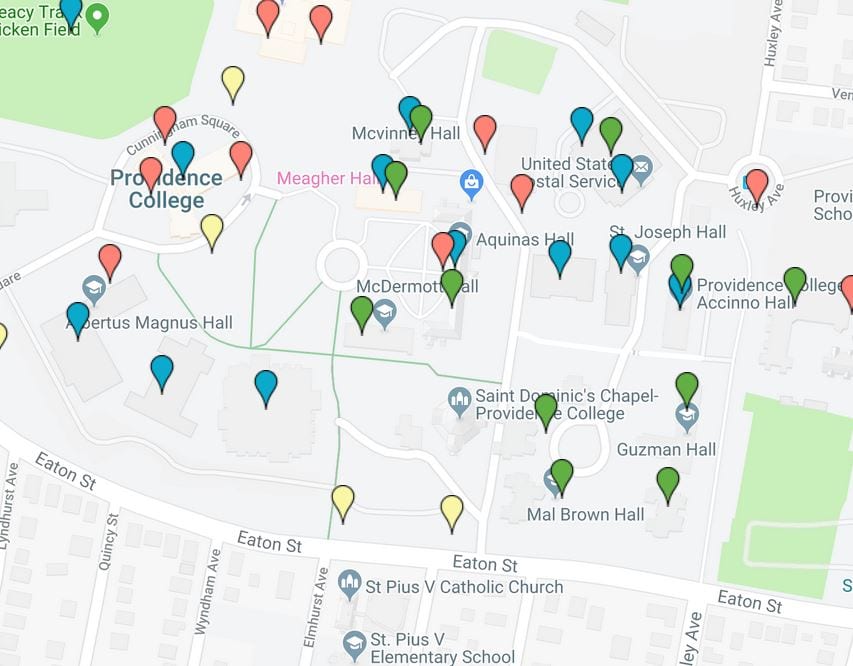Committee Structure
Sustainability Committee Charter
November 28, 2018
Once we start to think about the kind of world we are leaving to future generations, we look at things differently; we realize that the world is a gift which we have freely received and must share with others. – Laudato Si 159
Committee Charge
Explore different options for assessing and reducing the College’s carbon footprint, but also work collaboratively with faculty and staff to educate all campus constituents, including students, about ways to be better environmental stewards and protectors.
Definition
Sustainability principles seeks to understand the future implications of our actions by focusing on the economic, social and environmental impacts of our personal and organizational decisions on the environment and society. Often referred to as the three pillar of sustainability: economic, environmental, and social, and often informally referred to as profit, planet and people.
Purpose
The Sustainability Committee will consist of administrative, faculty, staff, and student representatives working to make recommendations to the President and College community regarding policies to promote environmental sustainability on campus.
Specific responsibilities include:
- Implement sustainability policies that are inclusive of environmental education, facilities operations, management, academics and community outreach.
- Act as the advisory committee to the President on campus sustainability goals and initiatives.
- Develop an integrated Campus Sustainability Plan (CSP) that guides the College in an on-going effort to create an institutional culture of sustainability.
- Create a strategic set of measurable goals, projects and steps to reduce the College’s carbon footprint.
Focus Areas
The Committee will establish subcommittees as needed to focus efforts in areas of opportunity, which will include but not be limited to:
- Greenhouse gas inventory – benchmark campus greenhouse gases, develop a greenhouse gas emission reduction strategies and time line.
- Energy – evaluate energy conservation, on-site renewable energy, green power purchasing. Conduct energy audits and promote water conservation programs. Evaluate green building design options for renovations and new construction projects.
- Transportation – assess fleet vehicles, investigate alternative fuel vehicles, and evaluate use of public transportation, carpooling, alternative transportation, and bike programs.
- Curriculum and research – investigate how to introduce concepts of sustainability into the curriculum through an interdisciplinary approach. Enhance student research opportunities in environmental sustainability.
- Communication – inform the campus community of the committee’s progress. Establish a mechanism allowing the college community to contribute ideas to the committee. Maintain the sustainability webpage. Communicate sustainable programs/initiatives in the admissions and orientation process.
- Community Outreach – develop community outreach programs to enhance sustainability in the local communities in Providence.
- Alumni development- utilize the alumni network to support and participate in green initiatives and fundraise for projects. Identify grant programs for student/ alumni collaborative projects.
- Student initiatives – establish and administer green grant fund for student projects. Evaluate student activity fees for sustainability projects (for example, $5 per semester). Engage student participation in sustainability projects and programs.
- Purchasing – assess current purchasing policies. Establish green purchasing practices that reduce waste and transportation costs. Purchase recycled/post-consumer goods.
- Food Services – evaluate current food service contract for opportunities to buy local foods and produce. Evaluate the possibility of purchasing post-consumer paper products and the feasibility of composting food waste. Evaluate recycling practices with in the dining hall facilities.
Background
In April, 2016, Fr. Brian J. Shanley, O.P., President of Providence College, signed the Campus Compact Action Statement, triggering a process whereby the campus would inventory, analyze, and summarize our efforts to achieve the statement’s goals and commitments and identify future actions needed to strengthen these commitments. The Action Statement contains five commitments characterizing our current commitments and name the ideals toward which we will work with renewed dedication, focus, and vigor.
We empower our students, faculty, staff, and community partners to co-create mutually respectful partnerships in pursuit of a just, equitable, and sustainable future for communities beyond the campus—nearby and around the world.
We prepare our students for lives of engaged citizenship, with the motivation and capacity to deliberate, act, and lead in pursuit of the public good.
We embrace our responsibilities as place based institutions, contributing to the health and strength of our communities—economically, socially, environmentally, educationally, and politically.
We harness the capacity of our institutions—through research, teaching, partnerships, and institutional practice—to challenge the prevailing social and economic inequalities that threaten our democratic future.
We foster an environment that consistently affirms the centrality of the public purposes of higher education by setting high expectations for members of the campus community to contribute to their achievement.
As part of the Compact Action Statement, Fr. Shanley and Provost Hugh Lena appointed a campus-wide committee to draft a campus civic action plan. The Civic Action Plan states the actions our campuses will take as we move forward with a renewed sense of urgency, along with the impacts we expect to achieve. In consultation with a number of campus constituents, the following areas were identified as an opportunity for community engagement and civic learning:
- Establish a formal, standing Sustainability Committee for the College, and move toward hiring a full-time Campus Sustainability Coordinator.
- Explore different options for assessing and reducing the College’s carbon footprint, but also work collaboratively with faculty and staff to educate all campus constituents, including students, about ways to be better environmental stewards and protectors.
Sustainability Working Groups
11/28/2018
Suggested Working Groups






